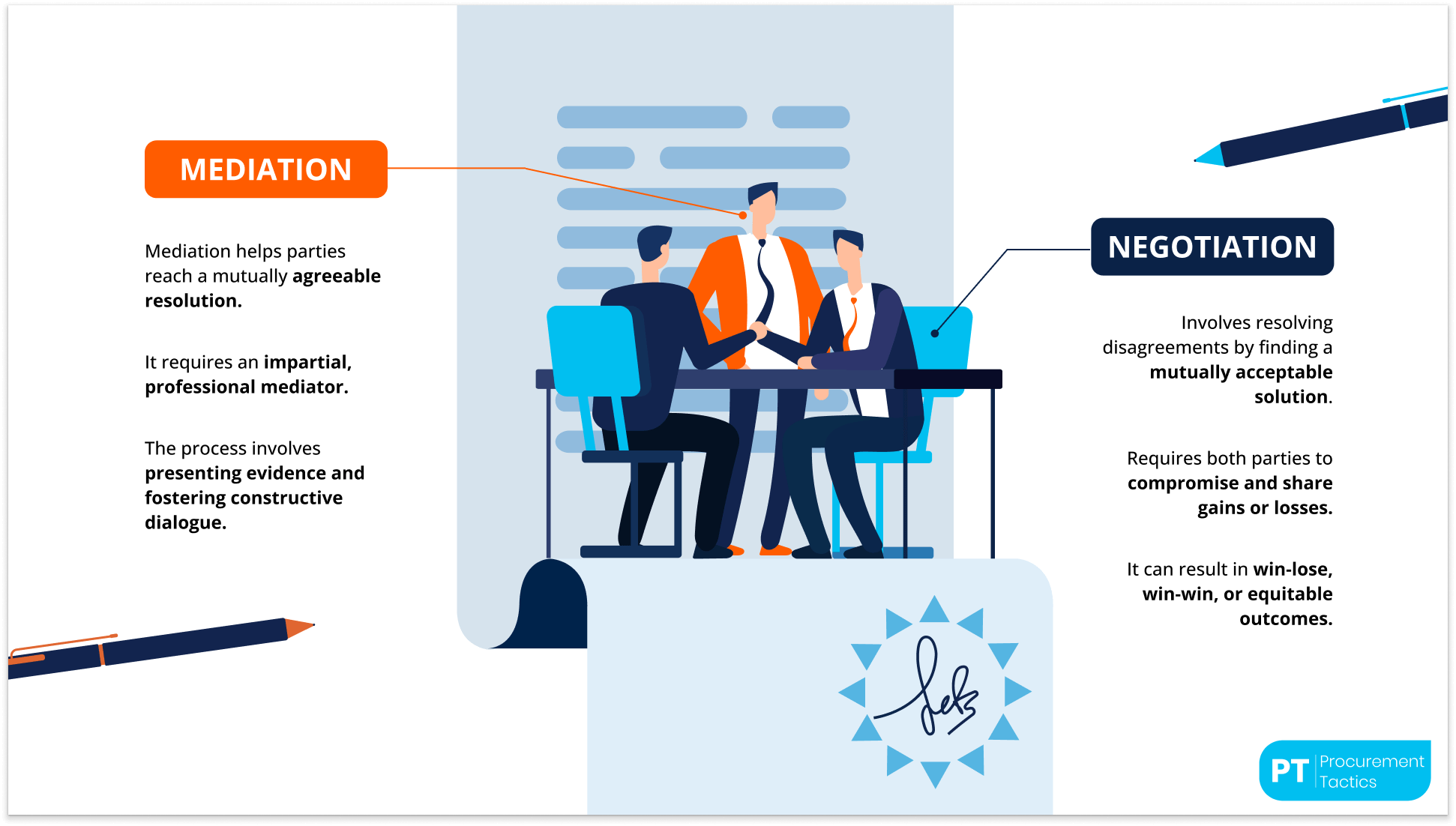Written by Marijn Overvest | Reviewed by Sjoerd Goedhart | Fact Checked by Ruud Emonds | Our editorial policy
Mediation vs Negotiation — 5 Key Differences

As taught in the Negotiation Course for Procurement Professionals / ★★★★★ 4.9 rating
What is the difference between mediation and negotiation?
- Mediation requires a mediator while a negotiation doesn’t.
- Mediation focuses on resolving disputes by guiding parties toward a mutually acceptable outcome through a third party.
- Negotiation focuses on finding a middle ground without the presence of a third party.
Mediation is when a third party settles a dispute or finds an acceptable resolution. Negotiation is when the parties concerned find a solution or reach a concession that both parties agree on. We’ll be delving more into this as the article goes on.
Differences Between Mediation and Negotiation

Here is a comprehensive side-by-side of the 5 key differences between mediation and negotiation.
What is Mediation?
Mediation is a dispute or conflict resolution technique where a person assists parties to come to a conclusion that is mutually agreeable to both parties.
The person assisting the parties must be unbiased and independent in nature. He or she must be an impartial person that must have nothing at stake in the conflict and his or her decision must be acceptable to all parties.
You must take note that the mediator does not just mean anyone recommended by the parties. A mediator should be a professional and experienced outside party appointed aiming to solve the dispute.
The mediator must possess independence, unbiasedness, and integrity when looking at the circumstances. His or her role is more like an advisor. Thus, the mediator’s decision is not binding but rather his or her advice assists parties to reach a settlement by suggesting solutions, listening to the issue, and persuading parties to come to terms.
During the meditation, both parties are given the time to present their evidence regarding their claims and the mediator summons a witness to verify the claims. Hence, it creates an environment that eases interaction between the parties involved.
What is Negotiation?
When you go to the market to buy ingredients and feel like the price is a little higher, you try to ask if the price can be brought down within your range. This is an example of negotiation where 2 people both lose something and settle for less than what they want.
Negotiation refers to an approach between parties in a dispute seeking to reach a concession by finding a solution for both parties to agree with. There are different types of negotiation as well, like avoidance negotiation and integrative negotiation, but let’s focus on the broader aspects of negotiation for this article.
In negotiation, the term dispute or conflict does not mean unrest, disruption, or quarrel, rather it implies disagreement between parties regarding their rights and interests. However, it requires that both parties must give something or compromise for it to be effective. Therefore, both parties must lose or gain something for the negotiation to be successful.
You must know that negotiation has three possible outcomes:
1. Win-lose -This outcome happens when one party wins while the other loses.
2. Win-win – The outcome for both parties is beneficial.
3. Inefficient but equitable – The outcome in which all the items are shared equally by both parties.
Similarities of Mediation and Negotiation
Mediation and negotiation are of course similar in the way they are used. Both of them are techniques used to resolve disputes between parties and come to an agreement.
Both negotiations are consensual and only produce a resolution if both parties will agree to the terms.
Furthermore, both negotiations seek to have a mutually acceptable outcome to resolve the problem at hand while also building a stronger rapport.
The Process of Mediation
In case you’re wondering how to go about the process of mediation here’s a list of the steps to keep you prepared!
1. The mediator states his or her neutrality in the dispute
Of course, in the first stage, the mediator states his neutrality in the dispute and describes the process of mediation to both parties.
The parties are informed about the fact that whatever will be disclosed will remain confidential even when they go to court for dispute resolution.
Furthermore, the mediator needs to gain the confidence and trust of the parties to effectively resolve the dispute.
2. The opening statement of the parties in dispute
In the opening statement, the parties in dispute will explain the issue from their perspective alongside their interest and perception of the issue.
3. Outlining the issue at hand
After the parties explain their sides regarding the issue, the mediator will decide the sequence or outline in which the negotiation will commence. Thus, it will enable parties to evaluate the progress themselves.
4. Exploring the issues
Once the sequence is outlined, the mediator helps the parties to concentrate on the issues and explore them further to check some ways to resolve them.
5. Private discussion
In this stage, the parties involved get the chance to present their side to the mediator one by one separately. You must take note however that the meditator is not allowed to disclose any information given by one party to another during this stage.
6. Joint session
Once the private discussion is over, a joint session will begin to move the parties to an agreement by providing them with an alternative solution.
If there is no consensus between the parties, a private discussion may be done to avoid deadlock situations.
7. Outcome/closure
Once the parties agree to the alternative solution, the dispute is settled as both sides agree to the terms of each other.
The Process of Negotiation
Here is the process of negotiation listed down in steps to guide you in the negotiation process.
1. Identifying the problem
In this stage, different issues related to salaries, economic benefits, and administration are identified. The issue at hand affects the entire negotiation process which includes the selection of representatives, the period of negotiation, etc.
2. Preparing the negotiation
In this stage, the parties involved prepare in advance the issues that they will raise during the negotiation, and representatives are selected for carrying out the negotiation.
3. Negotiation
The representatives of both parties put forward their initial demands and present their views to one another. During the negotiation, the representatives must focus on knowing the purposes of the other side so they can present counterarguments.
This goes on until a final settlement is reached. However, if they reach an impasse, then one of them may reach their walk away point from the negotiation.
Procurement Expert’s Advice on Mediation and Negotiation
For this article, we asked a seasoned procurement professional to share his insights on mediation and negotiation.
Sjoerd Goedhart
Owner, Goedhart Interim Management & Consultancy
LinkedIn Profile: https://www.linkedin.com/in/sjoerdgoedhart/
1. How do you differentiate between mediation and negotiation in procurement disputes?
“Mediation involves a third party who facilitates the process and the discussion and explores possible mutual agreements. Negotiation is a direct interaction where both parties are trying to reach their objectives. Mediation only works in win-win negotiations. When one of the parties wants to take it all (hard bargaining), it doesn’t work. Both parties must see the benefit of involving a mediator to agree.”
1.1 (Follow up) Can you provide an example where you chose mediation over negotiation, or vice versa, and explain the reasoning behind that choice?
“No, I haven’t chosen mediation. In negotiation, you should think in advance about the escalation levels. So you can use manager/higher management in your negotiation as an escalation level for the situation that your negotiation is stuck or turns into a not-solvable difference of opinion.”
2. In your experience, when is it beneficial to involve a neutral third party in procurement conflict resolution?
“In general, I don’t see the benefits of involving a third party in negotiations. It only works when a negotiation turns into a lawsuit. In this case, it can be cheaper to involve a mediator.”
Conclusion
This article delves into the realms of mediation and negotiation, elucidating the nuances that distinguish these alternative dispute resolution techniques. Readers gain comprehensive insights into the definitions, similarities, and differences between mediation and negotiation, empowering them to navigate these techniques effectively in their professional endeavors.
By understanding the distinct processes involved in mediation and negotiation, individuals are equipped to make informed decisions and foster resolutions that cater to the unique dynamics of each method.
Frequentlyasked questions
What is mediation?
Mediation is a dispute or conflict resolution technique where a person assists parties to come to a conclusion that is mutually agreeable to both parties.
What is negotiation?
Negotiation is an approach between parties in a dispute seeking to reach a concession by finding a solution for both parties to agree with.
What is the main difference between mediation and negotiation?
The main difference between the two is that mediation has a third-party involved to suggest solutions while negotiation does not involve the intervention of a neutral third party.
Be a Master Negotiator
Do you want to enhance your skill and be a master negotiator? Then check our Negotiation Course For Procurement Professionals to master the art of negotiation and lock every deal that you will do.
About the author
My name is Marijn Overvest, I’m the founder of Procurement Tactics. I have a deep passion for procurement, and I’ve upskilled over 200 procurement teams from all over the world. When I’m not working, I love running and cycling.






